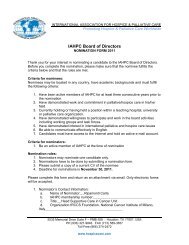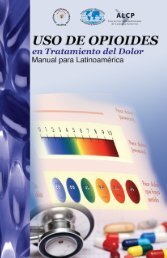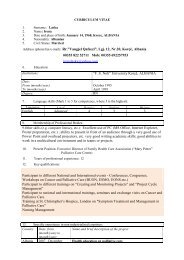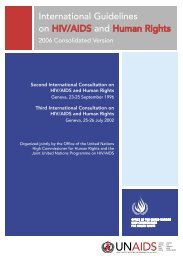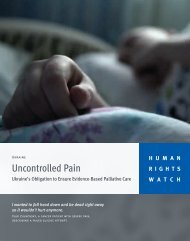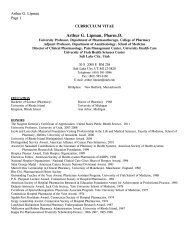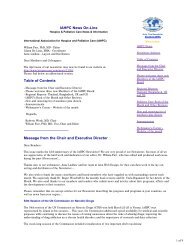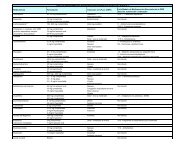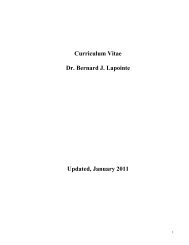Access to pain relief - World Hospice and Palliative Care Day
Access to pain relief - World Hospice and Palliative Care Day
Access to pain relief - World Hospice and Palliative Care Day
Create successful ePaper yourself
Turn your PDF publications into a flip-book with our unique Google optimized e-Paper software.
2. Length of supply allowed is short requiringrepeated journeys – which are potentiallyexpensive, a long way <strong>and</strong> difficult when ill– <strong>and</strong> repeated consultations with alreadybusy doc<strong>to</strong>rs.a. In Honduras only a three day supply of oralmorphine is dispensed.b. In Malawi only three days supply of analgesics aredispensed.c. Until the recent review of Romanian law, doc<strong>to</strong>rscould only prescribe three days supply of morphine(for a small number of specified diseases specialauthorisation from a government consultant could beobtained for ‘long term prescribing’ allowing 10 – 15days supply on a repeated basis for threemonths). (20)d. In Israel, unless the doc<strong>to</strong>r confirms that the patientlives far from a pharmacy, supply can only be givenfor 10 days at a time. Opioids are only available frompharmacies with Health Sick Insurance. In someareas there are few or no pharmacies with HealthSick Insurance, meaning patients have <strong>to</strong> travel along way for a few days supply. In addition, if any ofthe details required are omitted by mistake, thepharmacist will send the patient back <strong>to</strong> the doc<strong>to</strong>r,which, when distances are far <strong>and</strong> patients’ are ill,can deter patients from obtaining their drugs.3. A maximum dose is stipulated. This doesnot account for patient variability <strong>and</strong> thefact that there is no maximum dose ofmorphine.a. Until reviewed recently, the Romania pharmacopeiastipulated that no more than 60mg per day should(20, 21)be prescribedb. Drug laws in Israel state that no more than 60mg perday can be prescribed for non-cancer patients(confirmation that patient has cancer needs <strong>to</strong> be onprescription).4. Lack of HCWs qualified <strong>to</strong> prescribecontrolled drugs.a. In Honduras, Tamil Nadu, Mongolia, Peru <strong>and</strong>Kyrgyzstan only specialist palliative care <strong>and</strong>/oroncology doc<strong>to</strong>rs are allowed <strong>to</strong> prescribe morphine.b. In the Philippines only doc<strong>to</strong>rs with two speciallicences are able <strong>to</strong> prescribe morphine.c. Seventeen per cent of countries/regions werereported <strong>to</strong> require specific licences which were hard<strong>to</strong> obtain before being allowed <strong>to</strong> prescribemorphine.d. In Malawi (where clinical officers <strong>and</strong> doc<strong>to</strong>rs canprescribe opioids) there is only one doc<strong>to</strong>r for every100,000 people. (22) Prior <strong>to</strong> a recent amendment,Ug<strong>and</strong>an laws allowed only doc<strong>to</strong>rs <strong>to</strong> prescribeopioids; in rural communities there is only onedoc<strong>to</strong>r for 50,000 people. Therefore, most peopleare unable <strong>to</strong> access a doc<strong>to</strong>r. These figurescompared <strong>to</strong> 164 doc<strong>to</strong>rs per 100,000 in the UK,where since May 2006 specialist nurses canprescribe opioids in addition <strong>to</strong> doc<strong>to</strong>rs.5. Lack of HCWs able <strong>to</strong> dispensecontrolled drugs.a. Ug<strong>and</strong>an law allows only pharmacists <strong>to</strong> dispenseoral morphine. In 2000 there were only 19pharmacists outside the capital (ie 19 pharmacists <strong>to</strong>cover a population of just over 21million). (23)b. In the Philippines only pharmacists with S3 licensesare allowed <strong>to</strong> dispense oral morphine.22



